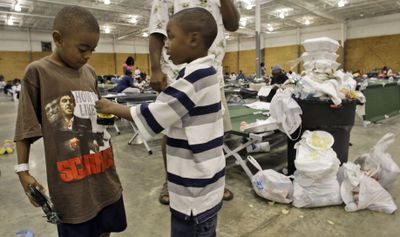Gulf Coast evacuees told not to return home yet
Officials say hurricane left a mess behind

NEW ORLEANS – Even though Hurricane Gustav did not wreak the destruction expected when it struck the Gulf Coast on Monday, officials said on Tuesday that they were not ready to allow many of the 1.9 million Louisiana residents who had evacuated to return to their homes.
While the worst was avoided – there were no major levee breaks of the sort that inundated New Orleans after Hurricane Katrina in 2005 – Louisiana Republican Gov. Bobby Jindal cautioned that the state still faces major hurdles before life returns to normal.
“This was a serious storm that has caused major damage,” Jindal said, as the hurricane’s trailing edge continued to dump rain across the state. “This is a challenge that is not going away overnight. We did not have the levee breeches, but we have major challenges from Hurricane Gustav.”
Massive power outages were among the most immediate problems, with some towns completely without electricity. More than 130 transmission lines and dozens of substations were knocked out of service, meaning Gustav was surpassed only by Hurricanes Katrina and Rita in 2005 in the destruction caused to the region’s electricity grid.
About 1.4 million customers are without power in Louisiana, and vast portions of the New Orleans and Baton Rouge metropolitan areas have been knocked off the national electricity grid.
Of immediate concern were about a dozen hospitals that had limited electricity service, raising the possibility that some of the 800 patients will need to be evacuated – in addition to the hundreds already removed to more secure facilities, Jindal said.
Meanwhile, Gustav continued to spawn bad weather. The National Weather Service reported that a tornado touched down in New Orleans’ West Bank neighborhood Tuesday night, and there were reports of flooding along several rivers in residential neighborhoods on the northern shore of Lake Pontchartrain, roughly 20 miles north of New Orleans.
There had been concerns that the storm would disrupt energy supplies from the Gulf of Mexico, which accounts for 25 percent of U.S. oil and 12 percent of natural gas production.
But Energy Secretary Samuel Bodman said initial flights showed no visible damage to 3,842 oil and gas production platforms along the coast, and he expected quick restoration of production.
Oil markets greeted Gustav’s passing with relief. Prices slid to $109.71 a barrel, down $5.75 from Friday’s closing price but little changed from the price over the holiday in electronic trading.
In Washington, the White House announced that President Bush will visit Louisiana today to view the havoc caused by Gustav. Bush plans to make several stops in the state.
By several standards, Gustav was far less destructive than Katrina, officials said.
According to a preliminary estimate by the Army Corps of Engineers, Gustav caused about a tenth as much damage as the 2005 Gulf Coast hurricanes, measured by debris and damaged roofs.
Jindal said the state is deferring to local authorities to determine when different areas are safe enough for residents to go back.
Parishes that sustained little damage announced that residents could begin returning today. Those with more significant destruction said residents will need to wait as late as Friday.
To get residents back to New Orleans, Democratic Mayor Ray Nagin announced a phased plan in which employees of major corporations and retailers are expected to return to the city today, with the rest of the city’s residents allowed back starting possibly Thursday.